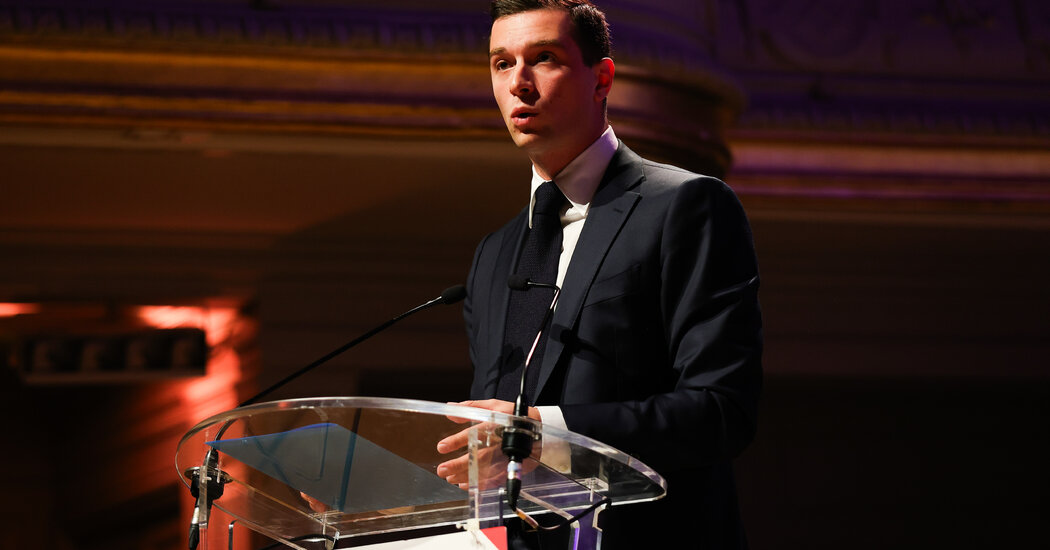Both the far-right National Rally party in France and its competing left-wing New Popular Front coalition are promising to save the country from financial ruin.
But French executives gave a chilly reception Thursday to competing economic platforms from the rival parties, warning that both could endanger the French economy and distance France from the European Union.
With less than two weeks before pivotal legislative elections, members of Medef, the main employers association in France, held an “audition” for candidates from the main political parties that are vying to seize power from President Emmanuel Macron, whose government has been severely weakened after his party was battered by the far right in European Parliament elections.
Mr. Macron called for snap parliamentary elections, gambling that voters would reject extremes and embrace his centrist Renaissance party. The first round of voting is slated for June 30, and the final round for July 7.
On Thursday, in an ornate Paris concert hall packed to overflowing, business leaders grilled Jordan Bardella, the National Rally candidate, on how he would finance a law-and-order platform and booed when far-left candidates called for a wealth tax on billionaires. They applauded for the finance minister, Bruno Le Maire, who is essentially campaigning for Mr. Macron, and whose pro-business policies are seen as helping to burnish economic growth.
Patrick Martin, the president of Medef, set the tone, taking to the stage at the start of the event with the heads of other business groups to criticize what he said were unrealistic, free-spending populist pledges.
The buzz was palpable as Mr. Bardella, the firebrand protégé of the National Rally leader, Marine Le Pen and, at 29, the new face of the surging right, for the first time appeared in public with the head of France’s mainstream conservative party, Eric Ciotti. Last week, Mr. Ciotti broke a political taboo by embracing an alliance with the nationalist right. As the two presented their case that France’s economy would be better off if they took the reins of power, the buzz turned to a low murmur.
Executives in the audience took turns peppering Mr. Bardella with questions about his party’s views on economic policy, immigration and international investments. The young politician, a magnetic orator who has taken care to present a polished image in a tailored suit and dark ties, ticked off a list of priorities should he find himself in the once unthinkable role as France’s prime minister, alongside Mr. Macron.
These include slashing taxes on energy, gas and electricity for French households, cutting income taxes for citizens under the age of 30 and encouraging companies to raise salaries 10 percent. Immigrants with working papers who pay taxes could stay, he said, but would be required to leave France if they were unemployed for six months after their last job. He added that National Rally would finance more social spending for native French people by no longer allowing illegal immigrants to tap France’s health care system.
“I understand we have to assure people at the economic level,” Mr. Bardella told the crowd. “Our ambition is to restore order to the country, to the street and to France’s finances.”
At the other end of the spectrum was the New Popular Front’s platform. Investors are concerned that the coalition, which includes the Socialist, Green and communist parties, would throw financial caution to the wind with pledges to increase the minimum wage, cut the retirement age to 60 and freeze prices for basic necessities to help households buffeted by inflation.
Business leaders booed when Eric Coquerel, a representative of the left-wing La France Insoumise party, pointed at some in the audience as he criticized businesses for caring more about profit margins than people. “We want billionaires to pay more taxes,” he said.
The Institut Montaigne, a think tank in Paris, said Thursday in a report that the campaign platforms by the three main political parties would each cost over €10 billion ($10.71 billion) annually. The platform of the New Popular Front coalition would cost nearly 30 billion euros, more than any other.
But the French business world does not necessarily sway the opinion of people in the streets: The latest political poll, issued Thursday by the research firm IFOP, showed the National Rally would gain 34 percent of parliamentary vote, while the Popular Front would reach 29 percent. Mr. Macron’s Together bloc would get 22 percent, not enough to prevent gridlock.
The crowd was friendly to Mr. Le Maire, who addressed some in the audience on familiar terms and warned again that France would tip into chaos if either the far right or far left were to lead the country.
The European Union sanctioned France on Wednesday for breaching rules that require countries to maintain strict budgetary discipline. But business leaders have not forgotten that Mr. Le Maire oversaw a program to support employers and employees during the pandemic through a €300 billion spending spree that is one of the main causes of France’s outsize deficit and debt today.
“Without that program, so many companies would have gone bankrupt, and workers would have been destitute,” said Katy Jeandidier, who runs Vivre Adom, a small company that provides home care for the elderly. “They protected us, and now we want to keep things stable with this election.”
But Michel Picon, the president of U2P, the French trade group for local businesses, acknowledged that the National Rally had made big gains amid a rising sense of insecurity in towns and villages around the country.
He said that small business owners in these places felt a growing threat from a sharp rise in petty crime. Voters appeared to be linking it to illegal immigration, which Mr. Picon said was also fueling blowback against legal immigrants who worked in France — and who many businesses depend on for labor.
“We need more order in this country,” he said. “But we also need to protect immigrants who work and who have nothing to do with these actions.”
